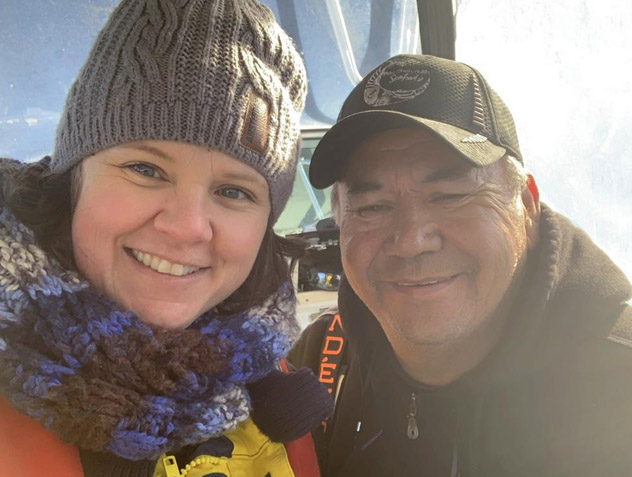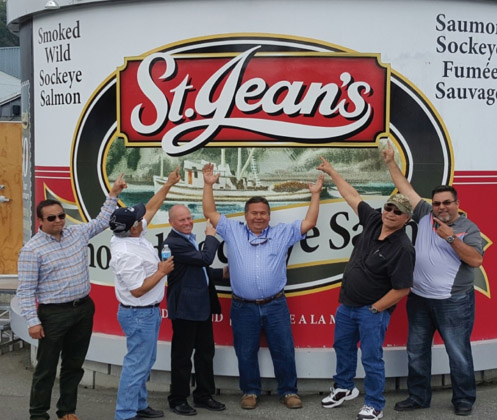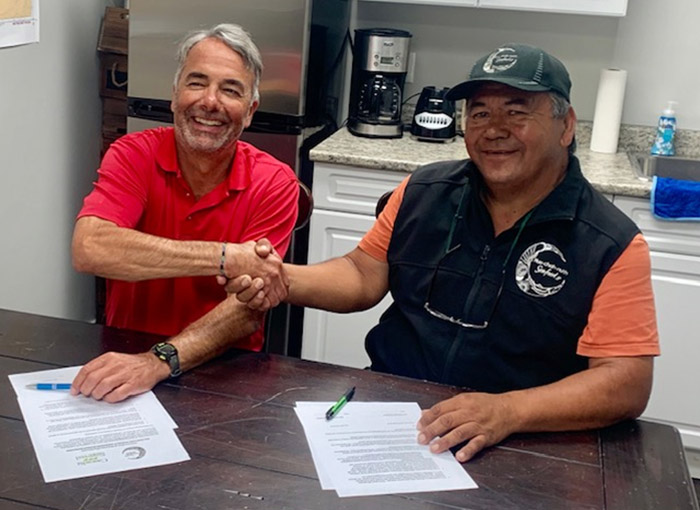|
|

|
  
Features
Update 2020/11/14
First Nations
CARRYING THE PAST INTO THE FUTURE WITH GUIDING PRINCIPLES
- CHANGE IS RIPPLING THROUGH BC’S COASTAL COMMUNITIES
By Suzanne Forcese
“Through education we increase capacity and knowledge within the Nations that can be shared through the generations to develop a renewal of their traditional seafood production. We honor the sacred principles that guide us:
‘Hish-uk ts’a-walk’ Everything Is One;
‘Iissaak’ A Greater Respect With Caring;
‘Uu-a-thluk,’ To Take Care Of, Using A Modern Approach”
Larry Johnson, President Nuu-chah-nulth Seafood LP

Jennifer Woodland CEO & Larry Johnson, President Nuu-chah-nulth Seafood LP
Photo Courtesy Nuu-chah-nulth Seafood
While many might describe the earth-shattering events of 2020 as challenging, there is light coming through the cracks. It is a promise of inherent resilience to Canada’s economy. Not by returning to the Past, but by practising principles that have guided First Nations Peoples from time immemorial.
WATERTODAY had the pleasure of speaking with Jennifer Woodland, CEO, and Larry Johnson, President of Nuu-chah-nulth Seafood LP, a First Nation owned seafood enterprise that operates on Vancouver Island’s pristine West Coast.
Jennifer Woodland, who also serves as Chair for the Canadian Aquaculture Industry Alliance, speaks of the potential imbedded in the timing of the pandemic.
“We need a surge of economic development. Together with Fisheries Canada, we are looking at the role of the oceans. Seafood can play a critical role in our bounce back, as well as in food sustainability.”
According to a report, (Aquaculture Opportunities in the Pacific Region, A Resource For Indigenous Communities):
“The world’s population keeps increasing and is forecasted to reach 9.7 billion people by 2050. The demand for more food is imminent, but in a planet where available arable land is decreasing and most wild fisheries have plateaued, agriculture and wild fisheries alone won’t be able to meet the demand.”
Woodland says the potential to turn this around lies in partnering with Indigenous coastal communities in sustainable aquaculture. There are communities in traditional territories that have the biophysical capacity to support farmed seafood. It is estimated that future growth of the industry in partnership with Indigenous communities would allow additional employment and earnings of $170 million over the next 5 years and over $410 million within 10 years for First Nations.
“Global aquaculture occurs in only 0.015% of the world’s ocean surface, which implies there is room for growth.”
Canada could be playing a leading role when considering our resources – high value native species, excellent ocean biophysical characteristics, the longest coastline in the world, a skilled workforce, dedication to science and proximity to the most important seafood markets (USA, Europe, Asia).
We also have the wisdom of our First Nations. Coastal communities in BC have a strong link to and dependence on the ocean that can be traced back thousands of years for Indigenous communities. Aquaculture offers an alternative to reliance on wild capture and also gives coastal people the opportunity to remain in their communities.
“Nuu-chah-nulth Seafood LP (NSLP) was formed in an effort to get the Nuu-chah-nulth Nations involved in shell fish aquaculture. The goal was to provide wealth for our communities, to educate, to provide training and marine certificates and to contribute to a healthier ocean,” President Larry Johnson said. “We are providing traditional way of life career options that allow our members to work and remain in their communities.”
“The Nuu-chah-nuth (meaning ‘People of the mountains facing the sea’) have understood our sacred place in our environment; and the trust placed in us to be responsible for all our resources; to live sustainably by understanding that everything is connected in a working ecosystem,” Johnson told WT. “How do our actions impact seven generations from now? What will be the effect on the environment?”
Nuu-chah-nuth Seafood is a sustainable seafood business with seafood access through licences and quota.
Woodland says the First Nations communities along BC’s coast are uniquely positioned for partnerships. “Our partners require the consent of the First Nations who are the rights holders of the land.”
“We’ve created a partnership model where everyone can benefit,” Woodland adds. “When you work with such marvellous people who follow the basic principles in every action – how can you not make this happen?”
Johnson, who grew up in a small community where water was always 50 to 100 feet within reach, fished without a line or a net. “Just grabbing the salmon with my bare hands – that was the connection. Knowing that a fish was giving its life for my sustenance and in return we would have prayer and ceremony for the spirit of the fish to provide for us. We never took more than we needed.”
It was second nature to Johnson. Everyone fished. “The men would go out in the big boats and the women in the small boats. We grew up respecting the fish and only taking what was necessary to get us through the winter.”
The thread that intertwines through the guiding principle of connectedness is best described by Johnson, “It’s much more than respect. It’s how you carry yourself with caring. For everything that surrounds us, and for everything that sustains us. My role is to remind our Board Members what we are investing in for seven generations.”
“It’s not about returning to the Past but about following the principles that have sustained our life and our environment.”
“Taking care is the sum total of the Nuu-chah-nuth principles of interconnectedness and respect. Our core values of sustainability, community, health and gratitude promote the foundation for taking care of ourselves and others.”
Both Woodland and Johnson reiterate how the pandemic has created a shift in perspective.
“We’re here to help. This is our Time. Our story is our certification.” Larry Johnson

NSLP buys St. Jean’s Smokehouse and Cannery. Larry Johnson centre. Inside the can is a wood-panelled museum/board room Photo Courtesy NSLP
“People are looking for shelf-stable food,” Woodland said.
“It’s great to be positioned to help out with the pandemic by providing food in a can,” Johnson said. “It falls in line with our traditions of preparing for the future.”
Johnson says that the goal of growing the business and creating partnerships is to “revitalize our communities and create opportunities for processing. We bought St. Jean’s because of its expertise and reputation and it aligns with our principles.”
Johnson sees a bright future in terms of diversification, of expanding the fishing fleet and profitable sales for Gratitude Seafood, NSLP’s own brand.

Gratitude Seafood – An Authentic Aboriginal branded seafood product line. “As Gratitude Seafood grows so does NSLP,” Johnson said Photo Courtesy NSLP
Breathing life back into the “hish-uk-ts’a-walk” not only means a multi-species seasonal approach of fin-fish and shell-fish aquaculture but it also means taking a fresh look at the third leg of the aquaculture tri-angle --Kelp.
“I was looking for an opportunity to break into the kelp industry,” Woodland told WT. “Kelp is grown in other parts of the world. Why not here?”
Woodland says she delved into a study of kelp in partnership with North Island College and had what she describes as a “serendipitous meeting with Bill Collins and Mike Williamson of Cascadia Seaweed”

CEO Mike Williamson of Cascadia Seaweed partners with NSLP Photo Courtesy NSLP
Cascadia’s phytologist, Dr. Jennifer Clark told us in a telephone chat “First Nations have been harvesting kelp for years because of the medicinal and nutritional benefits. We are now realizing the climate-positive impact of carbon sequestering and the fact that seaweed requires only water and sunlight to grow.”
Looking into the Future -- “We will keep on doing what we are doing,” Johnson told us. “We will continue to honour our guiding principles of protecting our environment and developing opportunities for member Nations and seafood development. We have the expertise to help our Nations reconnect with the ocean and revitalize economic development.”
Anii-tsa-chist “It means ‘Keeper of the Sea’ ,” Johnson says of the name bestowed upon him by his uncle, the Chief.
“I try to live up to my name.”
suzanne.f@watertoday.ca
|
|
|
Have a question? Give us a call 613-501-0175
All rights reserved 2026 - WATERTODAY - This material may not be reproduced in whole or in part and may not be distributed,
publicly performed, proxy cached or otherwise used, except with express permission.
|
| |